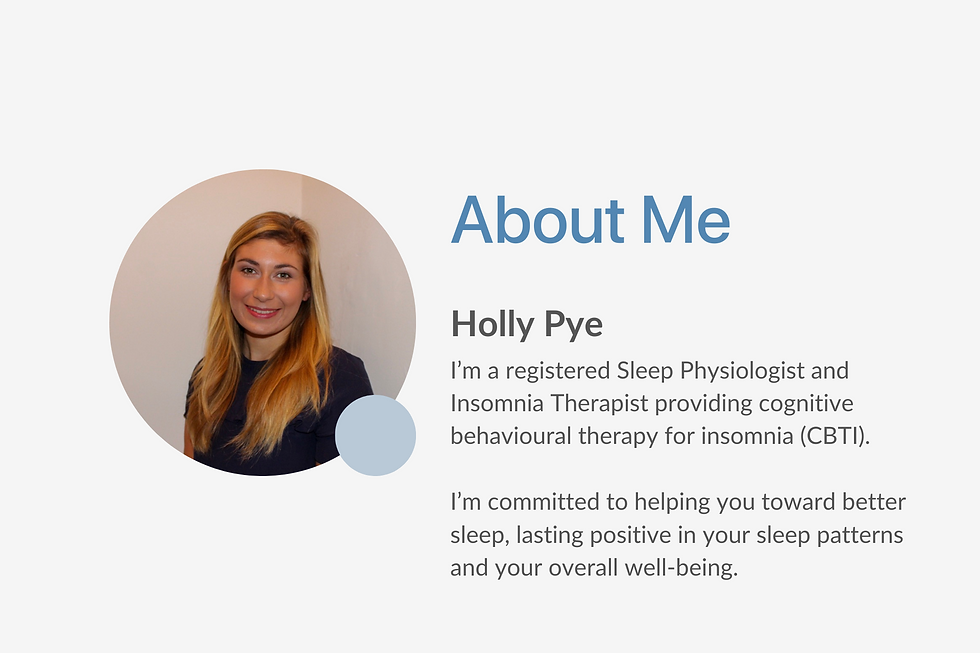Tips for Restful Nights: Different Types of Insomnia
- Feb 20, 2024
- 4 min read
Insomnia is a sleep disorder that affects many people worldwide. It is characterised by difficulty falling asleep, staying asleep, or waking up too early in the morning. Insomnia can be caused by various factors, including stress, anxiety, depression, medical conditions, certain medications and more.
There are three types of insomnia: onset, maintenance, and early morning awakening. Onset insomnia refers to difficulty falling asleep at the beginning of the night. Maintenance insomnia is difficulty staying asleep throughout the night. Early morning awakening insomnia refers to waking up too early in the morning and being unable to fall back to sleep.
Onset Insomnia
Ever found yourself tossing and turning, unable to drift into a deep sleep despite feeling exhausted? This type of insomnia is characterised by difficulty falling asleep at the beginning of the night, leaving you staring at the ceiling and counting imaginary sheep.
Onset insomnia can be triggered by a variety of factors, such as stress, anxiety, irregular sleep schedules, or even that extra shot of espresso mid-afternoon. It can feel like your mind is going wild when your body just wants to rest and the lack of quality sleep can lead to irritability, fatigue, and difficulty concentrating during the following day.
One of the most important factors in treating onset insomnia is ensuring you are feeling sleepy when you jump into bed - having an early night isn't going to be useful if your body isn't ready to rest. Some other tips include establishing a relaxing bedtime routine so that you're not feeling anxious whilst in bed, creating a comfortable sleep environment, and practicing relaxation techniques like deep breathing.
Maintenance Insomnia
So, you managed to conquer falling asleep quickly, but staying asleep? That's a whole different ball game and it's known as maintenance insomnia. You wake up in the middle of the night, eyes wide open, and the struggle to get back to sleep begins. You're tossing and turning, getting more frustrated as the hours tick by, knowing you have to be up in just a few hours and you desperately want to fall back to sleep.
Difficulty staying asleep can be caused by multiple different things, ultimately leading to poor quality sleep. Stress, anxiety, chronic pain, medications, or external factors like noise or needing to go to the toilet can wake you up in the night. Waking up once or twice a night is pretty normal, even for great sleepers, but if you can't fall back to sleep again within a few minutes you might need a few pointers to help you get your sleep back on track. Figuring out what's stopping you falling back to sleep quickly is key; usually it's the frustration and anxiety that the initial awakening causes. If you're brain is going around in circles like it's in overdrive, you're not going to be relaxed enough to fall back to sleep anytime soon. Cognitive behavioural therapy for insomnia can teach you some relaxation techniques to stop that racing mind and allow you to feel calm enough to get back to sleep again. Once this new thinking pattern becomes a habit, you'll likely find you're no longer waking up as frequently and won't have so many groggy mornings.
Early Morning Awakening Insomnia
Ever find yourself wide awake with the sun, way before your alarm has the chance to go off? It's as if your body has decided that 4 or 5 AM is the perfect time to rise even though you don't need to be up until 7 AM. You're tired, and wish you could just get those two more hours of sleep before your alarm sounds. Sometimes, you might fall back to sleep just for the last 10 minutes but then you have to get up feeling physically and mentally exhausted and without enough quality sleep.
Many things can cause you to wake up too early. Depression, anxiety, hormonal changes, or age-related changes amongst other factors can contribute. Learning how to get a better quality sleep without waking so frequently, and how to fall back to sleep quickly are important steps in resolving early morning awakening insomnia.
It's important to look for patterns; maybe you only wake up too early on weekdays when you're stressed about work, and weekends you can happily sleep in for hours. If this is the case, maintaining a consistent sleep schedule and waking up at a consistent time even on the weekends is important.
Insomnia is a common sleep disorder that affects many people worldwide. It can have a significant impact on an individual's life, leading to fatigue, mood changes, and difficulty concentrating during the day. Difficulty sleeping can be caused by various factors and can manifest in different ways. Some people only struggle with one of the above characteristics of insomnia, whereas many others will have a combination of two or even all three types of insomnia.
Understanding the different types of insomnia can help individuals seek appropriate treatment and improve their sleep quality. We're all very different and without understanding what the underlying causes of your sleep problems are, and proper treatment, insomnia can worsen and lead to more severe health problems in the long term.
By understanding the different types of insomnia and their causes, you can work with healthcare professionals to develop a treatment plan that addresses your unique sleep needs. Cognitive behavioural therapy for insomnia is the only treatment proven to improve sleep in the long term. It can help you to understand and treat the underlying causes of your difficulty sleeping, helping you to feel better.






Comments